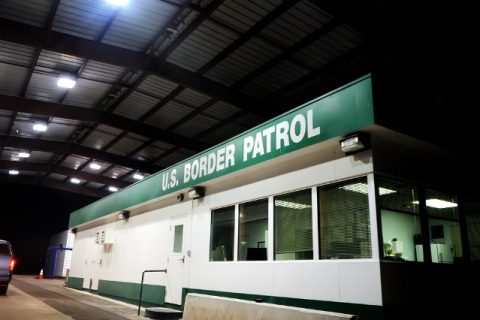Detention

House Immigration Bill Promotes Old Model Immigration Solutions
Today the House held a hearing on H.R. 2278, the "Strengthen and Fortify Enforcement Act" (the SAFE Act), which is designed, as its name suggests, to be a lopsided, enforcement-only bill that imposes additional criminal penalties, border security, and detention and deportation, while encouraging discredited policies such as self-deportation and state interference with immigration law. Instead of these old enforcement-only policies, which do not work, what is needed is a comprehensive solution that fixes our broken legal immigration system and provides a path to earned legalization. Read More

States Work To Improve Immigration Policies As Senate Immigration Bill Debate Begins
State legislatures are mostly winding down their 2013 legislative sessions after several states made huge strides on immigration reform. While Congress continues to debate how to overhaul the nation’s immigration system, several states have moved to make qualified undocumented immigrants eligible for in-state tuition rates and to allow undocumented immigrants to drive legally. These and other reforms at the state and local level are helpful changes to complement the national debate. Read More

U.S. Border-Enforcement Programs Target Immigrants Who Aren’t a Threat to Anyone
Since the Department of Homeland Security (DHS) was created in 2003, its immigration-enforcement agencies—Customs and Border Protection (CBP) and Immigration and Customs Enforcement (ICE)—have been officially devoted to the protection of U.S. national security and the prevention of terrorist attacks. However, the bulk of the work done by CBP and ICE on a day-to-day basis involves apprehending and deporting non-violent immigrants who have only committed immigration offenses such as unlawful entry or re-entry into the United States. The highly punitive treatment of these immigration offenders serves no national-security purpose and is not an effective deterrent. Read More

Hundreds of Detained Immigrants Held in Solitary Confinement
Every day, out of more than 30,000 detainees, roughly 300 immigrants are held in solitary confinement at the nation’s 50 largest detention centers overseen by Immigration and Customs Enforcement (ICE) officials, according to federal data. Solitary confinement is one of most expensive forms of detention, the New York Times reports, and nearly half of immigrant detainees held in solitary confinement are isolated for 15 days or more – “the point at which psychiatric experts say they are at risk for severe mental harm.” About 10 percent are held for more than 75 days. According to the New York Times, immigrants were regularly placed in isolation for breaking rules but also for protection: Read More

Hearing and Report Highlight Lack of Due Process in Immigration System
This week, Senator Christopher Coons of Delaware presided over a public hearing to discuss what so many of us know: the immigration courts are failing to provide a fair, efficient, and effective system of justice. Many of the concerns raised by Senator Coons, as well as some of the witnesses, during Wednesday’s Senate Judiciary Committee hearing, “Building an Immigration System Worthy of American Values,” are discussed in more detail in a report issued by the American Immigration Council this week, Two Systems of Justice: How the Immigration System Falls Short of the Ideals of Justice. Read More

Budget Cuts Led ICE To Release Immigrants From Detention
Along with every other government agency, on March 1, U.S. Immigration and Customs Enforcement (ICE) officials had to begin making mandatory cuts to their budget as a result of sequestration. ICE’s choice to shift some of its detainees from expensive detention facilities to non-detention alternatives was questioned yesterday by Members of Congress, but more importantly the decision demonstrates that alternatives to detention are a feasible choice—regardless of sequestration. Read More

Recognizing Immigrant Women’s Needs in Immigration Reform
While the recent debate over reauthorization of the Violence Against Women Act and the Trafficking Victims Protection Act may have reminded the nation that there are “women’s issues” in immigration law, it doesn’t necessarily follow that most people regard immigration reform as a woman’s issue. Despite the fact that immigrant women make up a growing share of workers, entrepreneurs, single heads of households, and new voters—while remaining primary caregivers in families—the laws we craft to reform our broken immigration system have often been insensitive to the obstacles and challenges immigrant women face in applying for immigration status. Read More

Immigrants Deserve Basic Miranda-Like Warnings When Arrested
As anyone who has watched an episode of Law and Order knows, police officers must give certain warnings to anyone placed under arrest, including that they have the right to an attorney and that the statements they make can be used against them in court. In the 1966 decision Miranda v. Arizona, the Supreme Court explained that providing these warnings prior to police questioning ensures that criminal suspects are aware of their rights and therefore are better protected against the intimidation inherent in police interrogations. Read More

How Budget Cuts From Sequestration Will Affect The Nation’s Immigration System
The U.S.’s immigration system, already burdened by application processing backlogs and insufficient funding for immigration courts, could become even more unwieldy if the government must slash its budget on March 1. Sequestration – a package of across-the-board government spending cuts totaling $85 billion this year and $1.2 trillion over the next decade – likely will go into effect on Friday unless Congress and President Obama manage to reach a deal. Currently, there are no reports of ongoing negotiations to avert the automatic cuts, so when the cuts kick in, all aspects of the immigration system – from visas to deportations – would be impacted. Read More

Incentivizing Arrests for Border Patrol Agents
Strengthening border security, including increasing the number of border patrol agents, continues to be a component of the latest immigration reform proposals, as they have in the past. What may be overlooked in these proposals is the administration’s call for enhanced training to protect civil rights. This is critical, given the results of a new report by Families for Freedom and New York University School of Law’s Immigrant Rights Clinic titled, Uncovering USBP: Bonus Programs for United States Border Patrol Agents and the Arrest of Lawfully Present Individuals. The report describes a series of operational flaws within USBP, including a previously undisclosed employee rewards program to encourage arrests. Read More
Make a contribution
Make a direct impact on the lives of immigrants.
